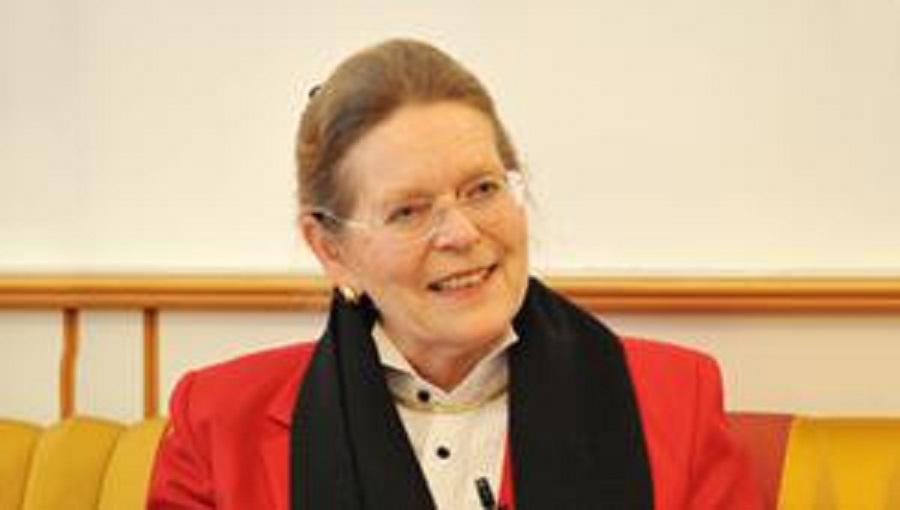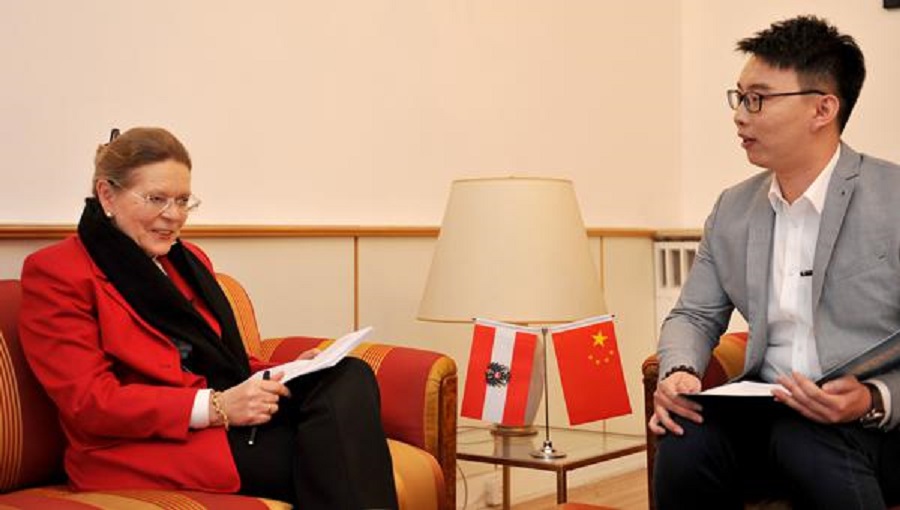Xinhuanet, Beijing, March 18th. On the occasion of China's "two sessions" in 2016, Austrian Ambassador to China Elena gave an exclusive interview with Xinhuanet. She believes that infrastructure construction can drive entrepreneurship, promote the development of small and medium-sized enterprises, and lead the economy forward. This successful experience from China can be transplanted to countries along the “Belt and Road”. The following is the transcript of the interview:

Austrian ambassador to China Elena is receiving an exclusive interview with Xinhuanet. (Photo by Xinhua Net reporter Xu Xin)
Xinhuanet: Your Excellency, China has entered the annual "two sessions" time. The "two sessions" are an important window to grasp the pulse of China's development. As the most direct link between your country and China, what issues on the "two sessions" are you most concerned about? why?
Ambassador: Of course there are many interesting topics. We are also carefully analyzing the work of the Chinese People's Congress within the framework of the European Union. China is committed to achieving balanced and fair wealth sharing for all people, and I am particularly interested in this. China hopes to fully build a "well-off society" by 2020 and become an advanced economy by 2049. This is closely related to the "Chinese Dream" proposed by General Secretary Xi Jinping. China has always announced the number of people who have been lifted out of poverty, which other countries have not done.
China’s "Anti-Domestic Violence Law" came into effect on March 1. This is a courageous and wide-ranging law. As the Chinese leader said, it is not easy to implement this law and regulation. The voices of people who really need legal protection in society are often weak, and social groups often play an important role in it.
Xinhuanet: This year is the first year of the "13th Five-Year Plan". The "Thirteenth Five-Year Plan" places innovation at the core of the overall national development, and continuously promotes theoretical innovation, institutional innovation, technological innovation, and cultural innovation. In what areas do you think China needs the most innovative reforms?
Ambassador: Innovation is highly valued in the 13th Five-Year Plan, and we are very interested in it. I think that innovation plays a very important role in the cultural field. China and Austria have extensive exchanges in this field, and many Chinese people like Austrian classical music very much. In addition, the two countries also have a broad space for cooperation in the field of contemporary culture. Of course, in the field of economic cooperation, innovation is also very important. Right now, China and the EU are negotiating an investment protection agreement. This will greatly promote cooperation and innovative development between the two parties.
In addition, the areas of environmental protection, natural resource use, and sustainable development that were highlighted at the "Two Sessions" can also increase innovation. Especially in the treatment of environmental pollution, Austria and the European Union have rich experience and have developed many new technology applications with complete systems. The two sides can strengthen cooperation in this regard.
Decades ago, we also encountered similar problems, so the two sides should strengthen exchanges, learn from each other, and find ways to cooperate in innovation. In the field of scientific research, China and Austria, China and the European Union can also seek more cooperation. In December 2014, China issued a policy to promote the development of science and technology. We believe that this policy will promote future cooperation between the two parties in the field of scientific research.
Xinhuanet: China’s economic development has entered the “new normal”. It is shifting from high-speed growth to medium-high-speed growth, and from extensive growth of scale and speed to intensive growth of quality and efficiency. The Chinese government has implemented supply-side reforms. In this process, what are the challenges that China faces?
Ambassador: I think the first issue is overcapacity. It is related to the reform of state-owned enterprises, market settlement, production costs, and bankruptcy liquidation of companies that have no economic benefits. These issues are not easy for any economy, and Europe is no exception. The second is unemployment, which is a difficult problem for all economies. Faced with such a scale of structural adjustment, labor redundancy is almost inevitable. It is very important to establish a good social security system in advance to prevent unemployed workers from falling into a bottomless pit. I am very happy to hear from Premier Li Keqiang's speech that the Chinese government has solved the resettlement problem of most workers. The Chinese government will provide unemployed workers with new training opportunities in the future.

Austrian ambassador to China Elena is receiving an exclusive interview with Xinhuanet. (Photo by Xinhua Net reporter Xu Xin)
Xinhuanet: As you said just now, China still faces many problems on the road of development. But we should also see that China's economy is basically gearing up. The Chinese economy is still an important force driving the development of the world economy. So, do you still have confidence in the future of China's economy?
Ambassador: I believe that the economy of China still has strong strength. In all walks of life, you have high-quality outstanding talents and employees full of enthusiasm for work. I believe that Chinese leaders will use all effective means to lead the Chinese economy through the transition period.
Xinhuanet: Openness is an indispensable topic when talking about the economy. In recent years, the Chinese government has consistently implemented an open policy. In 2013, President Xi Jinping put forward the “One Belt One Road” initiative, which is to create the “Silk Road Economic Belt” and the “21st Century Maritime Silk Road”. What do you think of this initiative?
Ambassador: This strategic initiative, its influence is not only reflected in diplomacy, but also in foreign economics. In terms of foreign economy, I think we should strengthen the infrastructure construction of the countries along the “Belt and Road” because in those areas, the backward infrastructure greatly restricts the development of these countries. This experience comes from China's existing practice in the past few decades. Promote entrepreneurship through the construction of infrastructure, promote the development of small and medium-sized enterprises, and lead the economy forward. Therefore, this successful experience can be transplanted to countries along the economic belt. In addition, this initiative can also promote the economic development of some economically backward provinces in China, such as some areas in the west. The "One Belt, One Road" initiative connects various regions closely through trade, exchanges and investment. The improvement of the economic level will also have a positive impact on the stability of the region and China as a whole.
For the European Union, the "One Belt One Road" initiative is a very important initiative. The "Belt and Road" provides a very important channel for Europe. This European network will successfully link the infrastructure construction of China and Europe together. China-Europe infrastructure construction will be carried out along two closely connected routes, one runs from west to east through Europe, and the other is based on China's "Belt and Road" from east to west.
Austria has always played an important role in the three regions of Central and Eastern Europe, Southeastern Europe and Central Asia. On the one hand, we look forward to seeing China’s “One Belt, One Road” initiative that can stimulate the economic and trade vitality of these regions, which will also have a positive impact on Austria. On the other hand, with our long-term experience in this region, we believe that Austria can establish a good partnership with China to jointly promote the implementation of related projects in countries along the Silk Road.
Xinhuanet: Cooperation in the energy field is also an important topic in the "Belt and Road" initiative. We know that you have in-depth research in the field of environmental protection and energy, and you have co-authored a book on climate change in Africa before. Chinese officials have proposed that the development concept of innovation, coordination, greenness, openness, and sharing must be firmly established and implemented. In terms of green development, what advanced technologies and development concepts in your country do you think can be shared with China?
Ambassador: I think there are many aspects that can be shared with each other, especially technical sharing and communication. Nowadays, technology sharing and exchanges occur more among enterprises than at the national level. Austria has its own advantages in the energy sector, and renewable energy plays a huge role in our country. Most of the electricity supply in our country is done by renewable energy sources, such as hydroelectric power generation. There are mountains, valleys and rivers all over Austria, so we can easily use water resources to generate electricity.
In addition, in order to promote the development of renewable energy sources such as bio, photovoltaic, solar and wind energy, both Austria and the European Union have formulated corresponding policies, laws and regulations. In this field, we not only have advanced technology, but also formed some comprehensive concepts. We hope that we can also carry out in-depth exchanges on these concepts. For example, in Austria, we have some ecological cities and regions. They practice their own environmental protection concepts to prevent global warming. The development concept of these cities and regions is not limited to the application of a certain new technology, but is aimed at the change of the entire environmental protection system. In recent years, we have held four events to promote advanced environmental protection technologies in China. This autumn, our Austrian Minister of Agriculture, Forestry, Environment and Water Resources Andrä Rupprechter will also visit China again to promote the concept of environmental protection. We will discuss and communicate with Chinese partners.
Xinhuanet: Your Excellency, how do you comment on the development of Sino-Austrian relations in recent years?
Ambassador: I am very happy for the development of relations between the two countries. We have made progress in many areas of cooperation. In the field of science and technology, we have carried out many very interesting projects, such as low-carbon technology, environmental protection technology, new materials, renewable energy and so on. For example, in some difficult high-tech fields such as nanotechnology, China and Austria have also launched cooperation. Our two countries have close exchanges in both cultural and political fields. Last March, Austrian President Fisher paid a state visit to China and attended the Boao Forum. In his conversation with President Xi Jinping, it was mentioned that Austria will also actively participate in the “Belt and Road” initiative. Now, Austria is a founding member of the Asian Infrastructure Investment Bank. This year we hope to further promote the development of bilateral relations, and I am full of confidence in this.

